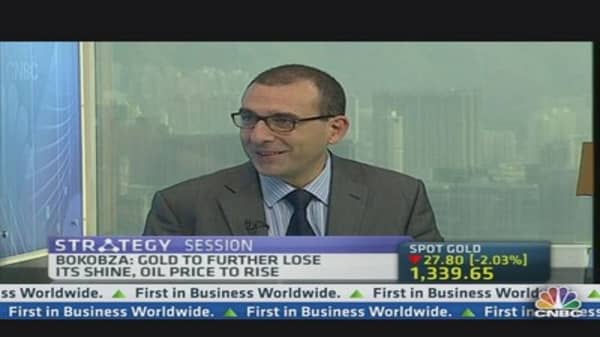Equity, bond and commodity markets sold off sharply in Europe and Asia on Thursday, picking up the baton from the sharp falls on Wall Street, after the U.S. Federal Reserve suggested it could start to unwind its monetary stimulus program later this year.
European shares traded sharply lower on Wednesday as the market digested comments from Federal Reserve Chairman Ben Bernanke suggesting that asset-purchases could end later this year.
All major European indices traded over 1 percent lower, with the French CAC and the German DAX hit the hardest.
News that the flash HSBC China Purchasing Managers' Index, a gauge of manufacturing activity, hit a nine-month low in June exacerbated the sell-off in Asian markets as investors also fretted about the outlook for the world's second biggest economy.
Japan's benchmark Nikkei stock index tumbled 1.7 percent, gold prices extended their falls to hit a one-month low and emerging market currencies took a beating with the Malaysian ringgit falling more than 1 percent to its lowest level in about a year.
(Read More: After the Fed—What's the Market's Next Move?)
"Markets are not trying to rationally judge what the real impact of a tapering of QE [quantitative easing] is likely to be," said Richard Jerram, chief economist at Bank of Singapore on CNBC Asia's "Squawk Box."
"I think everyone is looking at everyone else in the market and trying to figure out if there is going to be panic. And if you want to panic you want to do it early, which is why we've seen volatility," he added.
The Fed concluded a two-day meeting on Wednesday with a statement that the central bank would continue its $85 billion worth of monthly asset purchases for a while longer, but Bernanke hinted the policy could start to be unwound later this year.
(Read More: Taper Tipoff? Bernanke Hints Easing End Is Nearing)
Markets globally have been gripped by fears of unwinding of the Fed's monetary stimulus program for the past month and Wednesday's comments from Bernanke added to the unease.
"For weeks now we have been talking about higher interest rates and for the most part we do have these targets for unemployment and inflation, but it will take time for the dust to settle," said Ben Lichtenstein, president at Tradersaudio.com, referring to the Fed's commitment to keep its key interest rate near zero until unemployment falls to 6.5 percent and inflation rises to 2.5 percent.
The jobless rate currently stands at 7.6 percent while inflation is at 1.4 percent.





